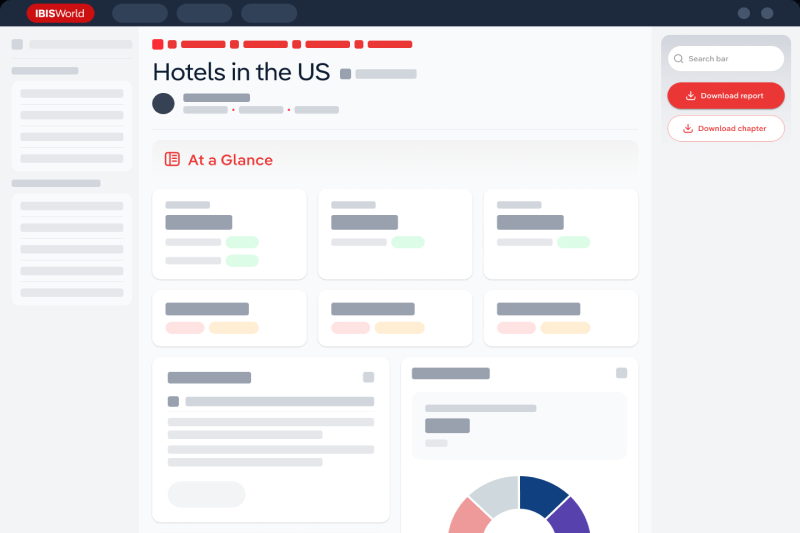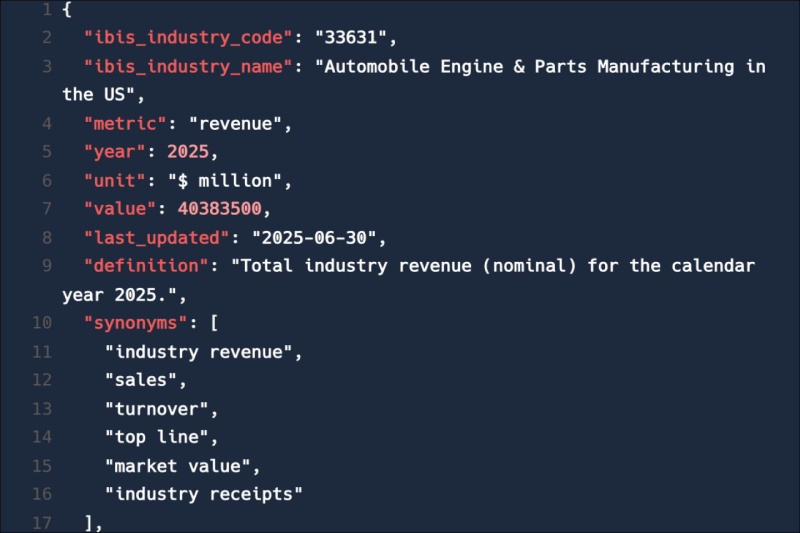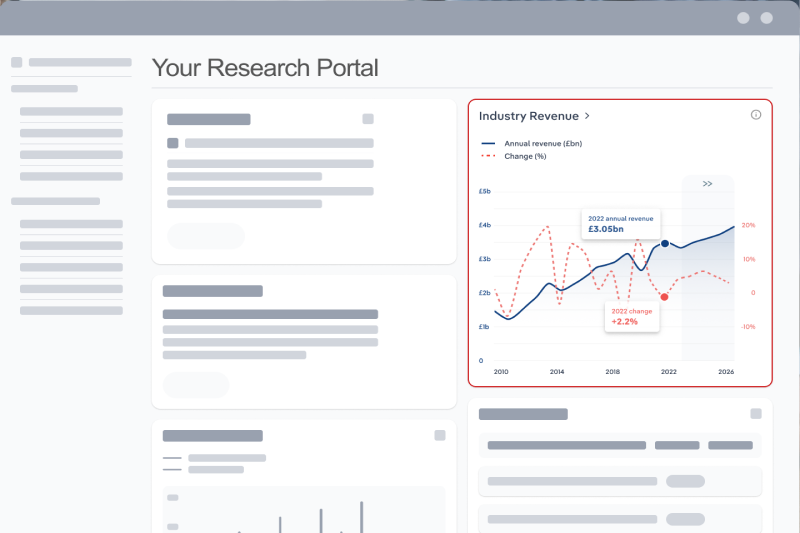IBISWorld Platform
Answer any industry question in minutes with our entire database at your fingertips.

The Door Lock and Lockset Manufacturing industry has expanded alongside recovering construction markets, driven by renewed spending on higher-value locks. Post-pandemic low interest rates enabled homeowners to finance renovations more affordably, sustaining demand for home improvement products. Although higher inflation-driven rates temporarily slowed growth, declining rates are once more revitalizing construction activity. Rising adoption of keyless locks across homes, offices and vehicles, alongside increasing integration of smart home security systems, is positioning the industry for continued expansion and innovation in both residential and commercial segments. As a result, industry revenue is forecast to expand at a CAGR of 2.9% through 2025 to total $6.2 billion. In 2025, industry revenue is expected to continue on this upward trajectory despite trade uncertainty, rising 2.3%.Tariffs imposed by the Trump administration in 2025, including levies on imports from Mexico and Canada, aim to limit competition from foreign producers. Imports currently satisfy nearly 20.0% of domestic demand, with low-wage countries offering lower-cost products due to relaxed regulations, increasing pressure on domestic manufacturers. However, exemptions for goods meeting USMCA rules of origin have maintained steady imports from Canada and Mexico, limiting market disruption. Global leaders like Assa Abloy and Allegion will continue to dominate the domestic landscape at the expense of smaller manufacturers, leveraging scale, diversified production and supply chain strategies to navigate trade uncertainty and maintain a strong market presence.The industry is expected to expand as persistent perceptions of rising crime drive demand, even though overall national crime rates are projected to decline. Growth in downstream markets, including vehicle manufacturing, will increase demand for door locks and locksets, while favorable interest rates will support the construction sector. Leading manufacturers will advance keyless entry systems by integrating video intercoms, visitor access management and time-stamped entry logs, enhancing security and convenience across residential, commercial and automotive applications. Industry revenue is thus expected to expand at a CAGR of 1.9% to $6.8 billion through 2030.

Answer any industry question in minutes with our entire database at your fingertips.

Feed trusted, human-driven industry intelligence straight into your platform.

Streamline your workflow with IBISWorld’s intelligence built into your toolkit.
IBISWorld's research coverage on the Door Lock & Lockset Manufacturing industry in the United States includes market sizing, forecasting, data and analysis from 2015-2030. The most recent publication was released September 2025.
The Door Lock & Lockset Manufacturing industry in the United States operates under the NAICS industry code OD5777. This industry manufactures classic and keyless door locks and locksets. A door lock is a lock on an exterior door. Lockets are complete locking systems, which include knobs, plates and a locking mechanism. Related terms covered in the Door Lock & Lockset Manufacturing industry in the United States include privacy lockset, lockset and keyless lock.
Products and services covered in Door Lock & Lockset Manufacturing industry in the United States include Locksets, Deadbolt locks and Keyless locks.
Companies covered in the Door Lock & Lockset Manufacturing industry in the United States include Assa Abloy Ab and Allegion Plc.
The Performance chapter covers detailed analysis, datasets, detailed current performance, sources of volatility and an outlook with forecasts for the Door Lock & Lockset Manufacturing industry in the United States.
Questions answered in this chapter include what's driving current industry performance, what influences industry volatility, how do successful businesses overcome volatility, what's driving the industry outlook. This analysis is supported with data and statistics on industry revenues, costs, profits, businesses and employees.
The Products and Markets chapter covers detailed product and service segmentation, analysis of major markets and international trade data for the for the Door Lock & Lockset Manufacturing industry in the United States.
Questions answered in this chapter include how are the industry's products and services performing, what are innovations in industry products and services, what products or services do successful businesses offer and what's influencing demand from the industry's markets. This includes data and statistics on industry revenues by product and service segmentation and major markets.
The Geographic Breakdown chapter covers detailed analysis and datasets on regional performance of the Door Lock & Lockset Manufacturing industry in the United States.
Questions answered in this chapter include where are industry businesses located and how do businesses use location to their advantage. This includes data and statistics on industry revenues by location.
The Competitive Forces chapter covers the concentration, barriers to entry and supplier and buyer profiles in the Door Lock & Lockset Manufacturing industry in the United States. This includes data and statistics on industry market share concentration, barriers to entry, substitute products and buyer & supplier power.
Questions answered in this chapter include what impacts the industry's market share concentration, how do successful businesses handle concentration, what challenges do potential industry entrants face, how can potential entrants overcome barriers to entry, what are substitutes for industry services, how do successful businesses compete with substitutes and what power do buyers and suppliers have over the industry and how do successful businesses manage buyer & supplier power.
The Companies chapter covers Key Takeaways, Market Share and Companies in the Door Lock & Lockset Manufacturing industry in the United States. This includes data and analysis on companies operating in the industry that hold a market share greater than 5%.
Questions answered in this chapter include what companies have a meaningful market share and how each company is performing.
The External Environment chapter covers Key Takeaways, External Drivers, Regulation & Policy and Assistance in the Door Lock & Lockset Manufacturing industry in the United States. This includes data and statistics on factors impacting industry revenue such as economic indicators, regulation, policy and assistance programs.
Questions answered in this chapter include what demographic and macroeconomic factors impact the industry, what regulations impact the industry, what assistance is available to this industry.
The Financial Benchmarks chapter covers Key Takeaways, Cost Structure, Financial Ratios, Valuation Multiples and Key Ratios in the Door Lock & Lockset Manufacturing industry in the United States. This includes financial data and statistics on industry performance including key cost inputs, profitability, key financial ratios and enterprise value multiples.
Questions answered in this chapter include what trends impact industry costs and how financial ratios have changed overtime.
The Industry Data chapter includes 10 years of historical data with 5 years of forecast data covering statistics like revenue, industry value add, establishments, enterprises, employment and wages in the Door Lock & Lockset Manufacturing industry in the United States.
More than 6,000 businesses use IBISWorld to shape local and global economies
We were able to supplement our reports with IBISWorld’s information from both a qualitative and quantitative standpoint. All of our reporting now features some level of IBISWorld integration.

IBISWorld delivers the crisp business knowledge we need to drive our business. Whether it be serving up our major clients, winning new business or educating on industry issues, IBISWorld brings real value.

IBISWorld has revolutionised business information — which has proved commercially invaluable to exporters, investors and public policy professionals in Australia and overseas.

When you’re able to speak to clients and be knowledgeable about what they do and the state that they operate in, they’re going to trust you a lot more.

The market size of the Door Lock & Lockset Manufacturing industry in the United States is $6.2bn in 2026.
There are 943 businesses in the Door Lock & Lockset Manufacturing industry in the United States, which has grown at a CAGR of 8.0 % between 2020 and 2025.
The Door Lock & Lockset Manufacturing industry in the United States is likely to be impacted by import tariffs with imports accounting for a moderate share of industry revenue.
The Door Lock & Lockset Manufacturing industry in the United States is unlikely to be materially impacted by export tariffs with exports accounting for a low share of industry revenue.
The market size of the Door Lock & Lockset Manufacturing industry in the United States has been growing at a CAGR of 2.9 % between 2020 and 2025.
Over the next five years, the Door Lock & Lockset Manufacturing industry in the United States is expected to grow.
The biggest companies operating in the Door Lock & Lockset Manufacturing industry in the United States are Assa Abloy Ab and Allegion Plc
Locksets and Deadbolt locks are part of the Door Lock & Lockset Manufacturing industry in the United States.
The company holding the most market share in the Door Lock & Lockset Manufacturing industry in the United States is Assa Abloy Ab.
The level of competition is high and increasing in the Door Lock & Lockset Manufacturing industry in the United States.




